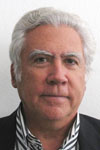In this series of posts, we sit down with a few of the keynote speakers of the 230th AAS meeting to learn more about them and their research. You can see a full schedule of their talks here!
 Astronomy education has numerous facets, from public outreach to K12 science, from higher education to research mentoring, and Professor Hernán Quintana of the Pontificia Universidad Católica de Chile has had a hand in improving all of them in his home country of Chile. He has developed televised public astronomy education programs, built a University astrophysics department from the ground up, and helped bring Chile to the forefront of astronomy, among many other contributions. Quintana is the first recipient of the AAS’s Education Prize from a country besides the United States or Canada. He will give a plenary talk on “The Growth of Astronomy Education in Chile” today at the AAS 230th meeting.
Astronomy education has numerous facets, from public outreach to K12 science, from higher education to research mentoring, and Professor Hernán Quintana of the Pontificia Universidad Católica de Chile has had a hand in improving all of them in his home country of Chile. He has developed televised public astronomy education programs, built a University astrophysics department from the ground up, and helped bring Chile to the forefront of astronomy, among many other contributions. Quintana is the first recipient of the AAS’s Education Prize from a country besides the United States or Canada. He will give a plenary talk on “The Growth of Astronomy Education in Chile” today at the AAS 230th meeting.
Quintana graduated from Universidad de Chile with a degree in engineering and physics then headed to the University of Cambridge in the United Kingdom, intending to pursue particle physics. The newly formed Institute of Theoretical Astronomy there had been at the forefront of key recent breakthroughs in astronomy, from the discovery of pulsars, to quasars, to the nature of the Cosmic Microwave Background. Impressed with not only the research but also the dynamic, collaborative, and international environment, Quintana switched to astrophysics, doing his PhD on elasticity in neutron stars. After a brief stint back in Chile, he then embarked on a career trajectory that led him through several of the world’s most influential astronomy institutions: the European Southern Observatory, the National Radio Astronomy Observatory (in the US), and the National Research Council of Canada. Armed with not only an established research portfolio but also the expertise and international contacts developed while at these institutions, he was then ready to return to his home country to begin the long process of reinvigorating Chile’s astronomy profile.
Astronomy in Chile has a tumultuous and paradoxical history. The country has some of the world’s best observing sites, but historically has lacked strong astronomy education. In the late 1970s Universidad de Chile dissolved their astronomy major, leaving the country without any significant higher education programs in the field. Today, thanks in large part to the decades-long effort by Quintana, there are now over a dozen astronomy programs at institutions across the country. The rebuilding began in the 1980s when Quintana and a few others started a new astronomy program within the physics department at Pontificia Universidad Católica de Chile. They aimed to create a vibrant, diverse, and international climate for students and researchers, bringing in well-known astronomers from Europe and the US for extended visiting professorships. They encouraged students to expand research areas beyond traditional astronomy and worked with administrators to help increase both the quality of students in the field as well as the financial support. In the late 1990s they created a new major in astronomy, and its success inspired other universities in the country to start astronomy programs. The nationwide growth has led to improved access to astronomy education and many more students pursuing careers in the field.
Despite these successes, Quintana is still deeply worried about the overall quality of education in Chile. His experience in working with government and University administration gives him unique insight into the broad and subtle landscape of higher education. The Chilean education system still faces funding challenges and the need for a high standard of accreditation. Reforms may be imminent, and he hopes the stakeholders will take into account the important balance between financial, academic, professional, and student concerns.
Overall Quintana is both passionate and pragmatic towards research and education. He cautions that building new programs is incredibly time-consuming, particularly in terms of administrative work. His advice to young astronomers who want to make a broader difference in their field? “Do science first! Develop the publications, the contacts, the prestige, become established, then you can start something.”
